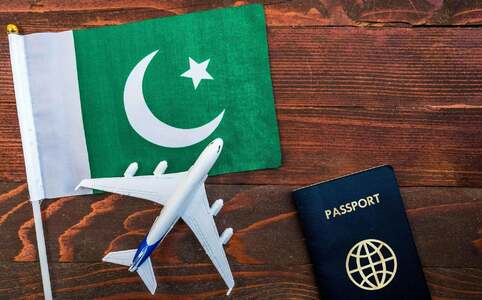IT’S December, and once more, Pakistanis living abroad have descended upon Karachi in the manner of Mongol hordes looking to seize the city. They pack the restaurants, throng the weddings, ransack the boutiques, spreading their North American lucre and flu everywhere they go.
It’s a seasonal happening: every winter for two weeks in December, they thunder down from the frozen wastelands of Mississauga, the British Midlands, and the American Midwest, and alight on the steppes of Sindh. They start to arrive in early December, and by the second week of the month, the full strength of the invading forces makes itself known.
Their horses bear exotic names: Emirati, Qatari, Turk Hava Yollari: magnificent white steeds that invade the skies over Pakistan in relentless waves, four or five times a day. Once the hordes arrive, they set up camp in places like the Sind Club and the Marriott, or in hapless relatives’ homes.
At first the atmosphere is festive, the air filled with the sound of exotic voices and accents. The hordes lure the locals in with tales of misery and deprivation in the hinterlands: severe weather, economic hardship, drudgery and isolation.
This wins them the sympathies of their welcoming hosts, who offer to take them around the city and show off its treasures. These foolish natives eventually collapse under the strain of having to feed and serve the invaders at all hours of the day or night.
When they first arrive, the invaders suffer from the mysterious condition known as ‘desynchronosis’.
When they first arrive, the invaders suffer from the mysterious condition known as ‘desynchronosis’. After a 48-hour period to recuperate from the difficult journey and acclimate to the milder temperatures, they commence their raids on the streets of Defence and Clifton.
They emerge from their hosts’ cars, Trojan Horses in the shapes of four-wheel drives and SUVs that take them straight to the treasury houses of the city.
Suddenly, it becomes impossible to find anything to eat in the city: every restaurant, barbecue, club and cafe is filled with the Western invaders. From early in the morning, the hordes are eating, filling themselves with halwa and paratha. Barely is breakfast over before it’s on to brunch and lunch, where they crowd the small tables, wearing trendy outfits and sharp-heeled shoes which double as weapons.
They brandish electronic recording devices to ‘capture’ every moment. They conquer through sound as well, shouting so loudly that the natives become deafened and meek in the face of their decibel power.
At night, they turn up in the hundreds at the tavernas and demand to be given the best meat, fish, fruits and sweets in town. There’s no limit to how much they can eat in a given day; the hordes are hungry, and they must be fed. Then it’s on to parties, weddings (Decemberistan is also mating season for the invaders, who prefer to come back to the steppes to arrange the marriages of their young), get-togethers and hang-outs.
They dine and squabble late into the night, accompanying their rabble-rousing with pounding music they’ve heard in their far-off lands, which restores to them a sense of happiness and belonging.
They jump into a cleared-off square in the middle of the room and throw themselves into grotesque shapes, a war dance that strikes terror into the locals’ hearts. They don’t return until late into the night, when they fall asleep and wake up to do it all over again the next day.
When they’re not carousing, they roam the shops. In this pursuit, the women are more bloodthirsty than the men, who stand around, heads slumped, staring glassy-eyed at their communication devices while the women pillage.
No tailor is safe, no designer dare shut up shop for fear of being beheaded, head displayed on a designer pike. Jewellery, silks, leather, fine pashminas and shahtoosh — they want it all to take back with them to the wilds.
They confuse their hosts with demands to ‘sight-see’: Mohatta Palace, the State Bank Museum, Jinnah House, Turtle Beach, the Science Museum and Dolmen Mall: they look for places where their offspring will be safe for a few hours while they refuel and regroup.
The children must absorb the local ‘culture’ and ‘values’ and take them back with them to their frozen hinterlands, so that they might retain some of their parents’ legacy. ‘This is your home,’ they tell the children, who only look confused. They learn to say ‘I love it here’ and ‘assalam aleikum’ on demand, to please the smiling relatives whose names they can’t remember.
Throughout, they confer: how strong is the nation? Is it on the verge of collapse? Where are its puppet leaders, and why aren’t they standing up to enemies at home and abroad?
The invaders insult the cowardly rulers, and expound on what the country needs in order to become strong again. But the weaker the nation gets, the more firm they are in their identity as Decemberists. Their presence infuses the nation with fresh blood, without which the entire country would meet its demise.
It all comes to a head on Dec 31st; the hordes ready themselves for one last night of hedonistic pleasure, before it’s time to return to their wastelands. They prepare themselves for the bacchanalia, dressing themselves in the finest furs, jewels, and leathers that are fashionable in their distant homelands.
They meet other hordes and dance and celebrate with abandon, trying to forget that the steeds and stallions are waiting at the stable, waiting to take them back to the frozen plains, the snow, the rain, the cold and the loneliness.
And when they leave, tearful and triumphant, bittersweet with parting but determined to come back next year and conquer again, Karachi falls silent, ravaged, and melancholy. Because this is the kind of invasion that brings friends, relatives and dollars, then takes them away, and which city can withstand that kind of occupation, year after year, generation after generation? Which heart, whether invader or invaded, is strong enough to always have to say goodbye?
The writer is an author.
Twitter: @binashah
Published in Dawn, December 31st, 2022















































